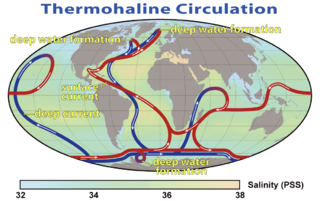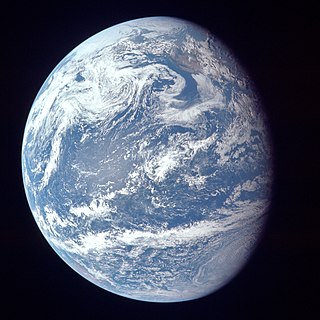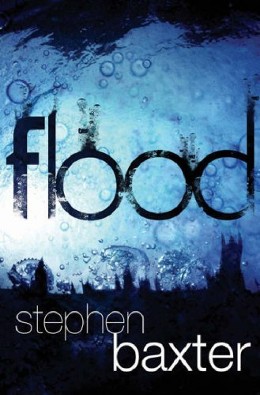
Oceanography, also known as oceanology, sea science, ocean science, and marine science, is the scientific study of the oceans. It is an Earth science, which covers a wide range of topics, including ecosystem dynamics; ocean currents, waves, and geophysical fluid dynamics; plate tectonics and seabed geology; and fluxes of various chemical substances and physical properties within the ocean and across its boundaries. These diverse topics reflect multiple disciplines that oceanographers utilize to glean further knowledge of the world ocean, including astronomy, biology, chemistry, geography, geology, hydrology, meteorology and physics. Paleoceanography studies the history of the oceans in the geologic past. An oceanographer is a person who studies many matters concerned with oceans, including marine geology, physics, chemistry, and biology.

Kenneth Alfred Ham is an Australian Christian fundamentalist, young Earth creationist, apologist and former science teacher, living in the United States. He is the founder, CEO, and former president of Answers in Genesis (AiG), a Christian apologetics organisation that operates the Creation Museum and the Ark Encounter.

The United Nations Conference on Environment and Development (UNCED), also known as the RioConference or the Earth Summit, was a major United Nations conference held in Rio de Janeiro from 3 to 14 June 1992.
The Earth Charter is an international declaration of fundamental values and principles considered useful by its supporters for building a just, sustainable, and peaceful global society in the 21st century. Created by a global consultation process, and endorsed by organizations representing millions of people, the Charter "seeks to inspire in all peoples a sense of global interdependence and shared responsibility for the well-being of the human family, the greater community of life, and future generations." It calls upon humanity to help create a global partnership at a critical juncture in history. The Earth Charter's ethical vision proposes that environmental protection, human rights, equitable human development, and peace are interdependent and indivisible. The Charter attempts to provide a new framework for thinking about and addressing these issues. The Earth Charter Initiative organization exists to promote the Charter.

The natural environment or natural world encompasses all living and non-living things occurring naturally, meaning in this case not artificial. The term is most often applied to Earth or some parts of Earth. This environment encompasses the interaction of all living species, climate, weather and natural resources that affect human survival and economic activity. The concept of the natural environment can be distinguished as components:
John Todd is a Canadian biologist working in the general field of ecological design. He addresses problems of food production and wastewater processing by using ecosystems technologies that incorporate plants, animals and bacteria. Todd has developed "Arks" or "bioshelters", ecologically closed "life-support systems" with the goal of sustainable functioning. He combines alternative technologies for renewable energy, organic farming, aquaculture, hydroponics and architecture to create "living machines" or "eco-machines".
The Natural Environment Research Council (NERC) is a British research council that supports research, training and knowledge transfer activities in the environmental sciences.

Mia Doi Todd is an American singer-songwriter. She was described by Dusted Magazine as "one of those artists that seem to function not just as creators in their own right, but as connecting links between other musicians."

Marine ecosystems are the largest of Earth's aquatic ecosystems and exist in waters that have a high salt content. These systems contrast with freshwater ecosystems, which have a lower salt content. Marine waters cover more than 70% of the surface of the Earth and account for more than 97% of Earth's water supply and 90% of habitable space on Earth. Seawater has an average salinity of 35 parts per thousand of water. Actual salinity varies among different marine ecosystems. Marine ecosystems can be divided into many zones depending upon water depth and shoreline features. The oceanic zone is the vast open part of the ocean where animals such as whales, sharks, and tuna live. The benthic zone consists of substrates below water where many invertebrates live. The intertidal zone is the area between high and low tides. Other near-shore (neritic) zones can include mudflats, seagrass meadows, mangroves, rocky intertidal systems, salt marshes, coral reefs, lagoons. In the deep water, hydrothermal vents may occur where chemosynthetic sulfur bacteria form the base of the food web.

A moonbase, lunar base, or lunar colony is a facility on or below the surface of the Moon, enabling human activity on the Moon. As such, it is different from a lunar space station in orbit around the Moon, like the planned Lunar Gateway of the Artemis program. Moonbases can be for robotic or human use, in both cases not necessarily including lunar habitation facilities.
This is a list of climate change topics.

The ocean is the body of salt water that covers approx. 70.8% of Earth. In English, the term ocean also refers to any of the large bodies of water into which the world ocean is conventionally divided. Distinct names are used to identify five different areas of the ocean: Pacific, Atlantic, Indian, Antarctic/Southern, and Arctic. The ocean contains 97% of Earth's water and is the primary component of Earth's hydrosphere, thus the ocean is essential to life on Earth. The ocean influences climate and weather patterns, the carbon cycle, and the water cycle by acting as a huge heat reservoir.

Flood is a 2008 work of hard science fiction by English author Stephen Baxter. It describes a near future world where deep submarine seismic activity leads to seabed fragmentation, and the opening of deep subterranean reservoirs of water. Human civilisation is almost destroyed by the rising inundation, which covers Mount Everest in 2052. Baxter issued a sequel to this work, entitled Ark, in 2009.
IMBeR is a Future Earth-SCOR sponsored international project that promotes integrated marine research through a range of research topics towards sustainable, productive and healthy oceans at a time of global change, for the benefit of society.
In 1997, a core set of six principles was established by ecological economist Robert Costanza for the sustainability governance of the oceans. These six principles became known as the "Lisbon Principles": together they provide basic guidelines for administering the use of common natural and social resources.

Environmental issues are disruptions in the usual function of ecosystems. Further, these issues can be caused by humans or they can be natural. These issues are considered serious when the ecosystem cannot recover in the present situation, and catastrophic if the ecosystem is projected to certainly collapse.

SAC-D, also known as Aquarius after its primary instrument, is an Argentine Earth science satellite built by INVAP and operated by CONAE. SAC-D was launched from Vandenberg Air Force Base on 10 June 2011, with a planned mission life of five years. Due to a power system failure, the mission was ended on 8 June 2015.
Earth system governance is a recently developed paradigm that builds on earlier notions of environmental policy and nature conservation, but puts these into the broader context of human-induced transformations of the entire earth system.










